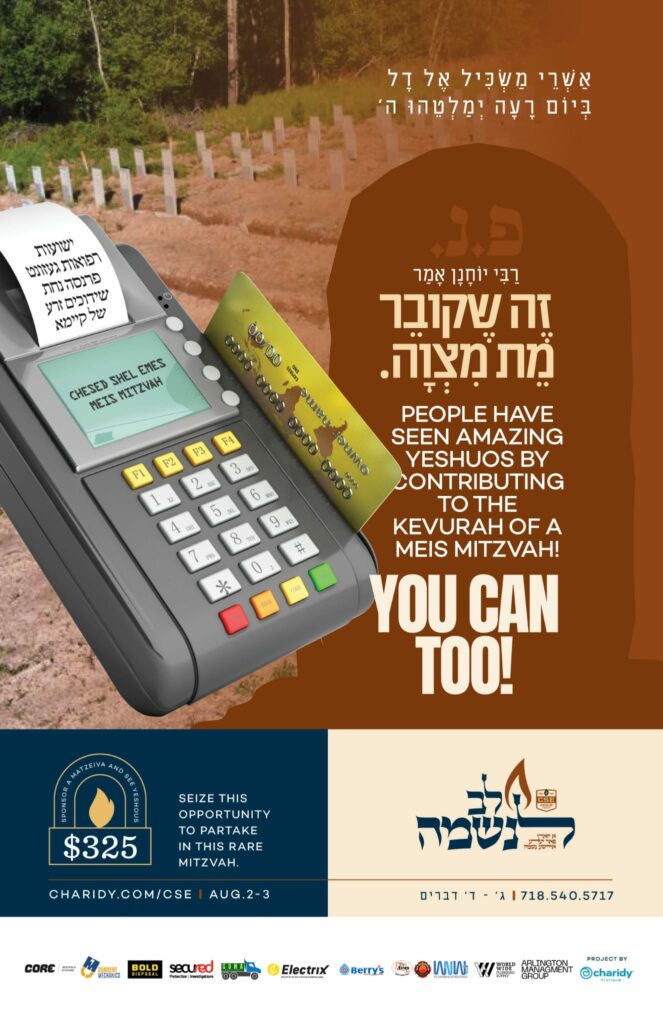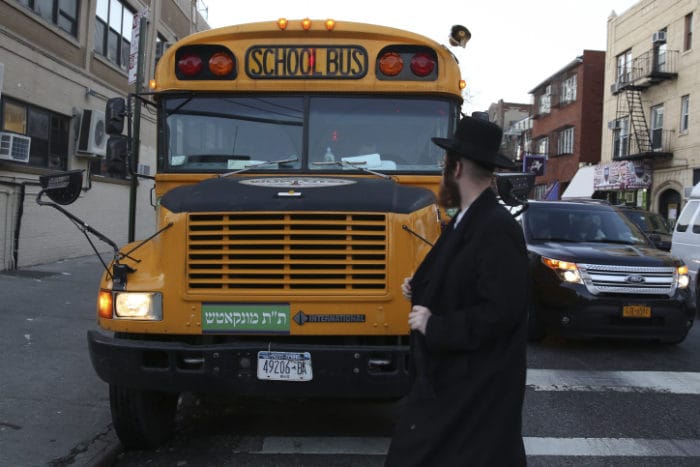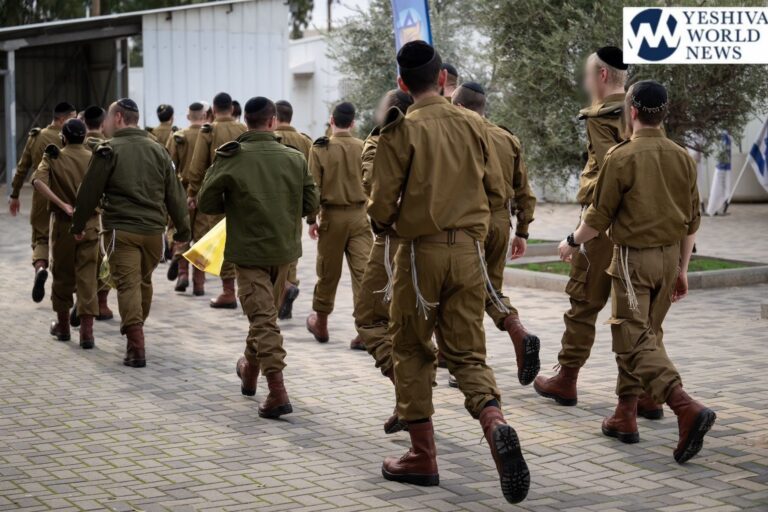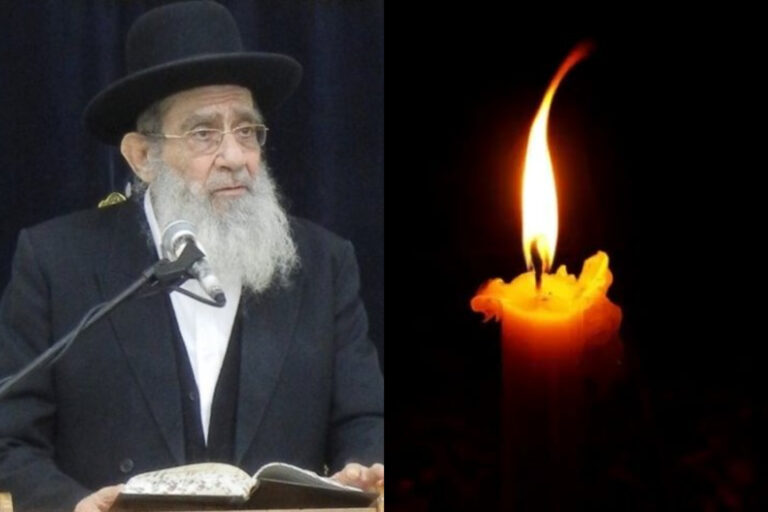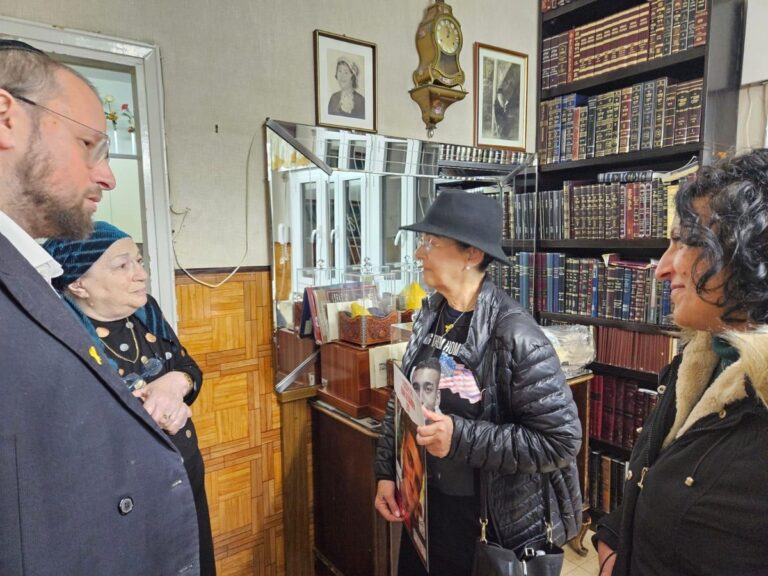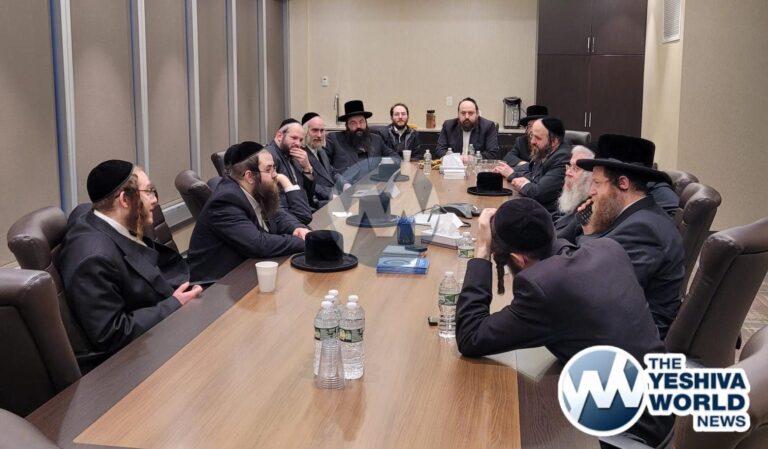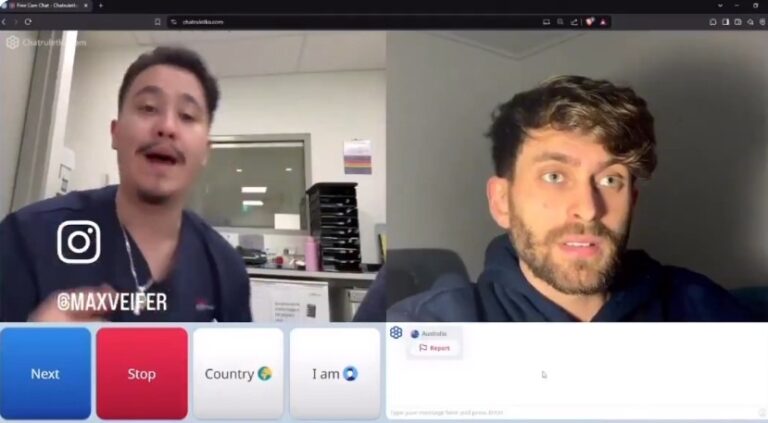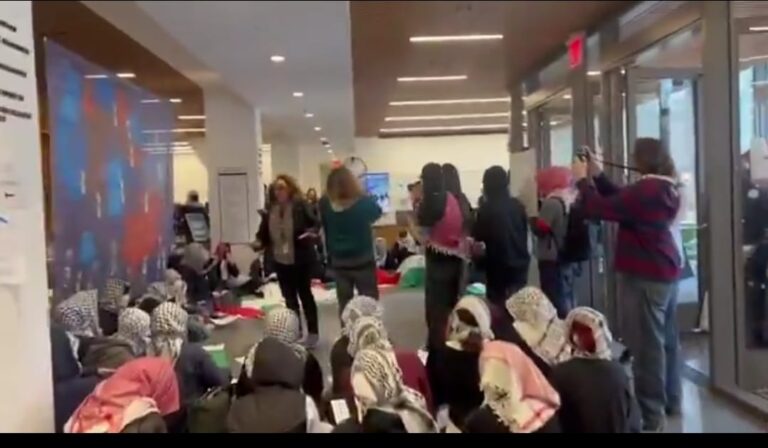The following is a true story that was featured in the Ami Magazine several months ago.
“Do you mind make a stop in New Square?” I ask my friend. “I need to drop off a package someone left in my car.”
Chilu was an easygoing fellow, and he wasn’t in a rush, so he agreed to make the detour. We had taken the afternoon off for my monthly erev Rosh Chodesh trip to Monsey, to daven at the kever of the heiliga Ribnitzer. Of course, I had my own share of things to daven for, but the focal point was to get Chilu engaged.
Chilu, who had passed his 25th birthday, was officially an alte bachur. Ironically, he was the last boy I’d expected to be single at his age. Chilu is a solid bachur, a sought-after chavrusa with a brilliant mind, sterling midos, and a magnetic personality. For some reason that eludes us, all of the guys in our chevra got engaged, one after the next, while Chilu was left behind in the dust.
And yes, he was still camped out in that very same dirah in Bais Yisroel we started out in. A faded picture of the kosel still graced the walls of the grimy apartment, and the three-seater couch which the Arab worker delivered for a few shekels was sagging in the center. The only thing that changed, Chilu would soberly tell me, was the new collection of open suitcases scattered in every corner of the room at the start of the new zman.
Now Chilu was home from the Mir and joined me on my monthly pilgrimage.
We drove into the quaint, serene village of New Square. I dropped off the package and remembered my Zeida, a devout Skvere chosid who was laid to rest in the Skvere Bais Olam. “Do you mind driving up to the gates so I can say a kapitel tehillim at my Zeida’s tzion?”
Chilu good-naturedly agreed. After all, as he expressed, “We just spent the last two hours saying tehillim by Ribnitz. A little bit more can’t hurt.” Little did he know how prophetic his words were!
We arrived at the Bais Olam, at the far end of the village, towards dusk. We washed our hands and walked into the gated area, where I soon found my Zeida’s kever. Chilu and I said a few kapitlech with fervor, but it was getting dark, and we needed to get back to Brooklyn. We hurried back out and stopped to wash our hands at the sinks outside the taharah shtiebel.
A man in his thirties emerged from inside the building and greeted us. We made small talk, and I mentioned that we stopped to daven at my grandfather’s tzion. The Yid, who was a member of the chevra kadisha, had known my Zeida well. “And this is your brother?” he glanced at Chilu.
“He’s like a brother,” I responded. “Chilu is one of my closest friends. We go to Ribnitz every Erev Rosh Chodesh to daven that he finds a shidduch.”
“Are you looking for a shidduch? I have a great seguah for you,” said the Yid, who introduced himself as *Gavriel Stein. “Why don’t you buy a couple of matzeivos?”
“Matzeivos? Isn’t that a segulah for a long life?” I asked, confused. Chilu just chuckled politely, convinced he was pulling our leg.
“Buying matzeivos is a powerful segulah for many things,” Gavriel explained. “And I’m not referring to the custom of buying a burial plot for yourself. What I mean is paying for a matzeivah for a niftar when there’s no family or the family can’t afford it.”
“Aha. So it’s like giving tzedakah. But what’s so special about this more than any other tzedakah?” I challenged.
“Do you have a few minutes?” was his response. “I have a great story for you.”
It was late and we were hungry, but the story seemed intriguing, as did the man. Chilu and I listened intently as he shared a personal story.
**
Several years ago, when my wife, *Chavy, was expecting a child, an ultrasound during the second trimester detected fluid at the back of the baby’s neck. The nuchal fold, or fold of skin at the back of the neck, was unusually thick as well.
We had no idea what that meant, or why the ultrasound technician was suddenly hyper-vigilant. But we soon realized we were in for a long and grueling ordeal, as her O.B. minced no words.
“It appears that your baby has many of the typical signs of Trisomy 21, the medical term for Down Syndrome,” he said. “I’m so sorry.”
My wife and I were stunned. Chavy was only in her mid-thirties, in perfect health, and the pregnancy had been uneventful so far. This wasn’t what we were expecting.
There were questions and doubts and sleepless nights and tears—lots of tears. My wife became a high-risk patient, as she received an ultrasound every week to monitor the baby’s growth. Another, more comprehensive ultrasound only confirmed what the doctor had suspected. The pictures showed a flat face, eyes that were slanted, and abnormally shaped ears. The blood tests were ambiguous, but the nuchal fold remained thicker than usual.
During these months we mostly kept the news to ourselves, not wanting to alarm anyone or be the topic of conversation. Chavy and I underwent a lot of soul searching, davened with all our hearts, trekked to Rabbonim for brachos, and sought a second opinion. We traveled to Boston to meet with a renowned specialist in fetal abnormalities. He didn’t accept our insurance, and the cost for the consultation was over a thousand dollars, but what won’t you do for a healthy child?
The specialists sent us for advanced, 3-D ultrasounds and performed more tests, before admitting that it was an open and shut case. Our baby had Trisomy 21, though she appeared healthy otherwise, with no heart abnormalities. “Many of these children are very good natured and easy to take care of,” he assured us. “With the proper therapy and care, your child can and will bring you a lot of joy.”
But Chavy wasn’t reassured. On the contrary; the news brought out her deepest fears. She began to sob, telling me that she didn’t feel qualified to raise a child with Downs. I was ambivalent and reassured her that she didn’t have to decide now, that she should wait and see. But Chavy wanted to research her options right away.
Soon we were thrown into a new world, a world of adoption vs. foster care, of talking to various agencies and therapists and experts on children with Downs. After consulting Daas Torah, we were advised to give up the baby for adoption as soon as it was born.
A few weeks later, by hashgacha, we were guided to a wonderful couple who agreed to adopt our new baby and raise him with love and devotion as their own. Once we finalized the details, Chavy slowly relaxed and began to live again. The rest of the pregnancy was uneventful, and she went into labor halfway through her ninth month.
When it was time to go to the hospital, we called the prospective adoptive parents to let them know that they would soon meet their new baby. In the meantime, we packed a bag, called a sitter for our other children, and drove to the hospital. I imagined the couple preparing their nursery and crib, stocking up on soft undershirts and tiny clothes for their baby, or, to be specific, our baby who would soon be theirs.
The trip to the hospital was a nightmare. As soon as we set out to the hospital, the car began to wobble. I pulled over to the side of the road and soon located the problem—my left rear tire was flat like a pancake. What now?
Calling AAA would take time we didn’t have. With my heart in my mouth, I drove over to the local tire shop – a three-minute drive. It was not yet an emergency—the birth was not imminent. I pulled up to the tire shop, which was owned by a frum Yid – R’ Mendel Rosenberg, I showed him the tire. He promised to get me back on the road within mere minutes.
While waiting for the tire to be changed, I noticed a row of matzeivos lining one wall of the tire shop. What in the world?
“This is my side job, or chesed,” the R’ Mendel told me with pride as his employees changed the tire. “I run an organization called Chesed Shel Emes, and one of the servixes we do, is that we bury Meisei Mitzvah – indigent people who have no one to care for their burial. We have seven cemeteries filled with Meisei Mitzva already. These are the latest shipment of matzeivos that are supposed to be sent upstate to our Woodridge cemetery.”
“How about I donate the cost of two matzeivos?” I said to the owner. “My wife is about to have a baby and I really need a big zechus.”
“You are making a wise decision,” said my newfound friend. “This is a true chesed shel emes and will be a zechus for you in the hours ahead.” I paid for two matzeivos. R’ Mendel told me “From every mitzvah that we perform, a malach is created in heaven, may this malach be a meilitz yosher for you in heaven.”
The tire was soon changed, and we continued to the hospital, where a neonatal team was waiting for us. Chavy was hooked up to a monitor, and we were joined by the wondeful couple who was going to sign the final paperwork after the birth, and take home our/their new baby.
Throughout the lengthy process, she tried to remain detached. After all, though she was giving birth to our baby, we wouldn’t be the ones raising this pure neshomoh. The thought caused us a lot of pain, and I davened to Hashem that a miracle should occur.
It was a few minutes before 6 a.m. when our precious little boy was born, weighing five lbs. 7 oz, emitting a hearty cry. Shortly after birth he was whisked to the NICU to be tested and examined. All I felt was grief. How I yearned to hold and cuddle our baby!
As I was about to sign the final adoption document, the head of the neonatal team came into the room and addressed us, a strange expression on his face.
“Mr. and Mrs. Stein, I have very good news for you. Your baby is completely healthy!”
“I know. The doctors already told me he didn’t have any heart problems,” I replied. “That is unusual for a child with Downs.”
“But your baby doesn’t have Down Syndrome,” he said. “He has none of the signs. He is a healthy baby boy! We took a blood test to confirm it, and will have the news within hours.”
I was stunned, dumbstruck, and euphoric. All I could do was cry and thank Hashem for His Miracle.
The next day the news was confirmed by the lab. All the doctor’s warnings and all those ultrasounds had hidden the miracle. Our baby did not have Trisomy 21 or any other complication.
Chavy and I were euphoric. Only now did we share the news with our extended family. We notified the adoptive parents, who completely understood our situation and were extremely happy for us.
We took our tiny little baby home two days later, and as I predicted; he filled our home with joy. Sruly is now a mature, beautiful boy who brings us loads of nachas.
Ever since then, I have become an active member in Chesed Shel Emes, and today I help raise money to pay for the burial expenses of the meisei mitzvah and their matzeivos. So, my friend, how many matzeivos will it be today?
**
Chilu reached into his wallet and removed his credit card without a word. We had both been very moved by the story. “I want to pay for five matzeivos,” he said. “And in this zechus, may I find my zivug very soon.”
“Omein!”
Neither of us were surprised when a shadchan he had never heard of called his parents three days later to redt a shidduch, and before long, she turned out to be his bashert.
At the l’chaim, the shadchan divulged that she had thought of the shidduch the past erev Rosh Chodesh, as she took stock of the shidduchim she had suggested the past month, and those who were still waiting.
I was stunned when I heard this, and goose bumps went up my spine. I realized that the shidduch was suggested on the exact day that Chilu paid for the matzeivos at the Skvere Bais Olam. We had stopped there, on a whim, after dropping off a package, but ultimately it was a detour that brought Chilu so many steps closer to finding his bashert.
Currently Chesed Shel Emes is running a campaign to expand their Meis Mitzvah Cemetery, to take part in this tremendous mitzvah please click here and may you merit to be the next story.

